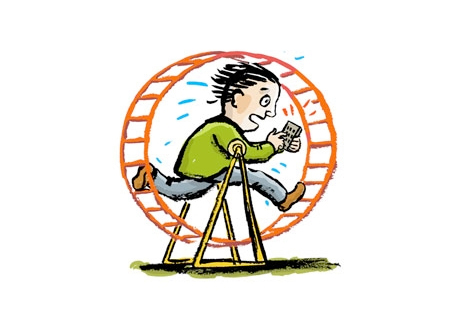|
Thanks for visiting - 2023 marks our 20th anniversary! This site is ad-free and supported by sales of our online courses. If you get value from what we write, click the link at the bottom of the page and read Day 1 of "Your inner narrative" to see if it's right for you...no email required. <> Earlier this week, we wrote about how people don't like to be uncomfortable. As such, they're always searching for ways to escape it. Some readers made astute observations about things we tend to be uncomfortable about, including meditating. Many people approach the practice with the belief that it will be relaxing. While relaxation can be a side-effect, it's not the goal - and, when someone gets a glimpse of how compulsive their mind is, it can be anything but relaxing! If you've gone through life without putting focused attention on your mind and the thoughts, emotions, urges, and inner narrative all of us have, it can be an uncomfortable experience. So much so, many will choose to stop meditating and return to being "lost in thought" (or, as we like to say, living on autopilot). Others abandon the practice because they are bored - that voice in their head is telling them they need to be doing something else, or that they're wasting their time sitting. Ironically, boredom is something you can observe during your practice - you can see it for what it is: the mind's propensity to want something different than what actually exists. The mind is never happy with the present moment, and it likes to feel in control. The thoughts and emotions that accompany boredom reveal this, and you can watch them as they come and go. More important, you can choose to move your attention away from them rather than getting caught up in them. What are we teaching our children? Beyond meditating, readers pointed out how we reinforce the drive to avoid discomfort in our children. Nothing is more representative of this than the philosophy that "everyone is a winner," and there are no losers when it comes to events they participate in. Everyone gets an award, everyone gets a trophy! What are we really teaching them, though? We are teaching them that discomfort in bad. Reality is, everyone can't win the game or the sporting event. Everyone can't be the smartest person in the class. Everyone doesn't always get what they want. You aren't always going to come out on top, and that's perfectly fine. What's not fine is teaching our kids to avoid discomfort. Or shielding them from the fact that life has ups and downs. A more healthy approach is introducing them to the concept of equanimity, and showing them how to apply it to the situations in their life (which, of course, means we must first learn to apply it to the situations in our lives!). Another healthy approach is teaching them that happiness isn't something they find "out there," by constantly chasing what brings them pleasure and running away from what brings them pain. If they don't learn this, they will be trapped on the wheel we referenced in the previous post. <>
Our minds constantly create stories about what we experience, and we spend most of our time caught up in those stories. This results in the stress and struggles of daily life. "Your inner narrative" (our 15-day online course) can help you break that pattern. Read Day 1 here (no email required). Comments are closed.
|
